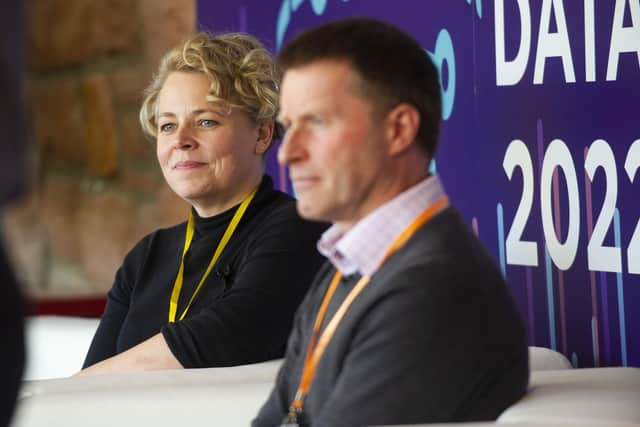Conference report: Help to deliver healthy results
Sarah Stock, a professor in maternal and fetal health at the University of Edinburgh, used clear examples in a panel discussion on using data for more diverse and inclusive health outcomes.
She said: “98 per cent of pregnant women will take medication during their pregnancy but only2 per cent of those drugs have information about whether they are safe and effective in pregnancy.”
Advertisement
Hide AdAdvertisement
Hide AdStock also explained that the Apgar Score – widely-used to assess the health of a newborn – was based largely on white children and was less predictive of the future health of non-white babies.


“We need to leverage data and research in a better way to help close the divide,” she told the event. “We have some fantastic data, but what’s important is linking it up. Data about pregnancy and maternal health is seen as different in some way.”
Stock observed that during the pandemic, she and others applied [in Scotland] for permission to examine data covering the whole pregnancy, including GP data and information about terminations.
Initially, they were told it was “too sensitive”, but did, eventually, get the data. She said: “We were able to use it to influence national and international policy, and we want to be able to make that data set available with the right restrictions around it.”
However, Stock added, the ability to get the same permission after the pandemic was “proving difficult”, and called for more “proportionate data governance” to balance risks with the benefits that could be delivered.
She said the Recovery Trial, which looked at the use of steroids for people with Covid-19, was a significant breakthrough because it included pregnant women, and far more trials needed to do that. “We are desperately trying to redress the balance [about a lack of data about pregnant women], and to generate good information on [for example] the impact of vaccines in pregnancy.
“Pregnant women have again been deemed a vulnerable group and we know there is hesitancy – but women and children have died because they did not get Covid-19 vaccinations during pregnancy.”
Roger Halliday, chief executive of Research Data Scotland (RDS) and the Scottish Government’s former Chief Statistician. said RDS had been established to find secure ways to collect data and share it with researchers.
Advertisement
Hide AdAdvertisement
Hide AdHe added that there had been significant data breakthroughs during the pandemic, including projects to identify people at the highest risk of Covid-19, and the impacts of the vaccines – among many others.
Halliday stressed that data sets had been made available much more quickly to researchers during the pandemic, but recognised that problems remained, with “lots of data locked up in individual organisations and systems.”
This could make it hard to link up data sets across organisations, but Halliday recognised a real commitment to give people more control over their data by linking up, for example, health and social care data – the challenge, he said, was to ensure that this happened systematically.
“We need responsible data use and we are working, and we are looking to optimise that, and take the best of what we have from the pandemic,” said Halliday.
He stressed that addressing inequality is at the heart of RDS’s work, which aims to create “a more unbiased picture of what is happening in the service and ensure policies are more inclusive”. This relies on further groundwork to “improve the completeness and accuracy of data”, he said.
Pooja Jain, director and founder of CogniHealth, an app which uses “digital solutions to transform the experience of living with dementia”, told the conference that her work is focused initially on the personalisation of dementia care, then prediction and prevention.
The ability to collect “behind closed doors” data about the personal experiences of carers was a central part of her work, she explained – to help personalise the support her firm can offer, but also to collect data to inform future approaches to dementia care.
“We can capture symptoms and track progression with the input and interaction of carers,” she said. Later, Jain explained that this could help make the voices of dementia sufferers and their carers heard – and help influence policy more effectively.
Advertisement
Hide AdAdvertisement
Hide AdJain added that capturing this “private” data – and making the app free to use – has made CogniHealth a much more inclusive product, which could be used globally. She said the firm was committed to “co-design” with families affected by dementia as well as academics, care providers and charities in the development of the app.
